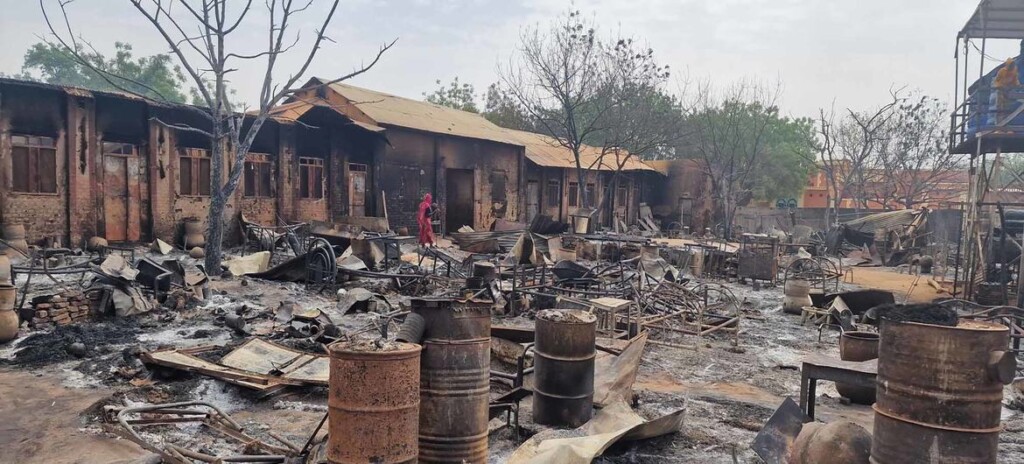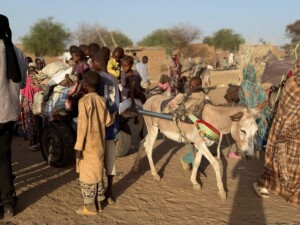Sudan schools to re-open as displaced shelters face uncertain future

A school that served as a shelter for newly displaced in El Geneina was torched in May last year (File photo: Mohamed Khalil UNHCR)
As Sudan schools re-open their doors to students and official plans are made for exams, classrooms doubling as shelter centres for the displaced will no longer be as available as before, prompting discussion over how best to balance Sudan’s displacement and education crises.
Schools re-opened in most parts of Northern State and West Kordofan yesterday. The school year has already begun in River Nile state, West Darfur, and Red Sea state. Students in Sennar and White Nile state started last year.
The school year in El Gedaref is set to start next week, meanwhile, Kassala is yet to set a start date, with discussions about sheltering displaced people residing in schools ongoing. The federal Ministry of Education is reportedly deciding when Sudanese secondary schools (Sudan certificate) exams will be held.
February 6, the Sudan Teachers’ Committee in South Darfur dismissed the decision made by the state Minister of Education to open schools, describing it as “lacking realism.” The Sudanese Teachers Committee continues to refuse to resume partial studies to avoid education becoming a “gateway for division” in Sudan.
According to Abdelwahab Ibrahim, director of the Ministry of Education in El Gedaref, the academic year will start on May 26. “However, the challenge is that a large number of schools have been turned into shelter centres for displaced people,” he said.
El Gedaref city and El Fao locality, neighbouring El Gezira, controlled by the RSF since December, are the most affected by displacement. About 60 percent of schools in the state capital and El Fao have been turned into shelter centres.
Tentative proposal
The ministry has reportedly proposed transferring the displaced from the city of El Gedaref to five schools with large yards and constructing shelters with local materials and tarpaulins.
They have proposed building communal bathrooms, as tents would be difficult to use from the rainy season next month. The other option is to build tents in the schoolyards and turn these into classrooms.
The authorities are now presenting the proposals to the displaced, but they will not force them to leave the schools, the education minister said. The ministry will accommodate the displaced students.
Ibrahim said that primary and middle school students are young and cannot be accommodated in schools far from their homes. He warned of the educational risks of one year of school closures, including illiteracy, drug abuse, and bullying becoming more common.
Arrangements in Kassala
In Kassala, the acting Minister of Education and Guidance and spokesperson for the Kassala High Emergency Committee, Maher El Hussein, reported that “integrated arrangements have been made to resume school education while creating a suitable environment for the displaced.”
They decided to allocate 60 percent of the schools in Kassala for education and 40 percent for shelter, including drinking water and toilets. Displaced children will be accommodated by the schools that they are attending.
Kassala is reportedly hosting 70,645 displaced families in 285 centres across the state. The minister said in a press statement yesterday that in a meeting with educational councils last week, he stressed the necessity of opening schools and resuming studies whilst causing minimum disruption to the displaced.
Sudan Certificate
The acting federal Minister of Education, Mahmoud El Houri, discussed school resumption and exam times with Malik Agar, vice president of the Sovereignty Council yesterday.
They discussed the importance of arranging to end the academic year in November in safe states and ensuring the provision of schoolbooks.
The number of students in Sudan is estimated at about 12 million, including nine million in primary and middle schools, distributed among 22,000 schools throughout the country.
The Sudanese secondary school exams will be scheduled in coordination with the Sudan Examinations Committee and the High Insurance Committee. Centres are expecting the exams to arrive in the so-called safe states not under control of the Rapid Support Forces (RSF).
Rejected
The war must stop to resume school, the Sudanese Teachers Committee told Radio Dabanga yesterday. “Over 350,000 teachers, administrators, and workers in the education sector are living in catastrophic conditions.”
They are also demanding for the Sudanese authorities to provide teachers’ salaries, rehabilitate school buildings, and deliver textbooks. Nonetheless, the organisation called on families to encourage children to return to classrooms if schools are accessible.
Authorities in Atbara, River Nile state, forced displaced people sheltering in two schools to leave the shelters on April 29. At the time, Ammar Yousef of the Sudanese Teachers’ Committee warned of catastrophic results if the opening of the schools in all states does not happen at the same time.
Before the conflict broke out, Sudan’s economy was suffering from massive inflation and shortages of basic goods, leading to protests across the country. After the war began, at least 10,400 schools had to close in conflict-affected areas, leaving about 19 million children without education.











 and then
and then